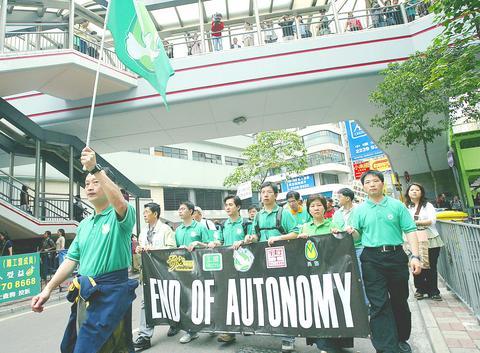Pro-democracy activists marched to China's representative office in the territory yesterday, demanding universal suffrage and accusing Hong Kong's leader of blocking reform.
"Hong Kong is ready and mature enough for direct elections," said Clare Lee, a 29-year-old organizer with the opposition Democratic Party.

PHOTO: REUTERS
Hong Kong's mini-constitution, the Basic Law, holds out the possibility that ordinary residents can elect their next leader in 2007 and all lawmakers by 2008.
But the protesters fear Beijing won't let that happen, and they accuse unpopular Chief Executive Tung Chee-hwa (董建華) of blindly backing the central government and thwarting the will of the people.
"He's killing the rights the Hong Kong people should have," said Tam Wai-to, a 44-year-old union leader.
Rally organizers said 200 people joined yesterday's march that started at Hong Kong government headquarters and then headed to the Chinese government's liaison office in the afternoon. Police declined to provide a crowd estimate.
"Fight for democracy," the protesters chanted.
Although Hong Kong people are clamoring for full democracy, Beijing and Tung have indicated they want any progress to come gradually. Critics call that a stalling tactic.
China's most powerful legislative panel, the Standing Committee of the National People's Congress, ruled earlier this month that Beijing would have to give advance approval for any political changes.
The committee is expected to issue another decision on Monday that critics fear will rule out direct elections for Tung's successor in 2007. Tung was chosen by an 800-strong committee that sides with Beijing.
Tung has weighed in by recommending that Hong Kong change its electoral policies. But he suggested a stringent list of conditions -- including taking Beijing's views into consideration -- that critics say will effectively stop the push for full democracy.
Ordinary citizens get to directly elect some lawmakers, however, and the number rises to 30 out of 60 this September, up from just 24 in the 2000 elections.
A pro-democracy lawmaker said yesterday that Hong Kong's government believes the possibility of direct elections in 2007 and 2008 will be ruled out by Beijing today.
The lawmaker spoke only on condition of anonymity and declined to identify the government official who made that prediction.
Tsang Hin-chi (曾憲梓), a Hong Kong resident and member of the Chinese legislative panel, defended Tung's suggestions on reform. Speaking in Beijing, he said yesterday that Tung's views were based on public consultations in Hong Kong.

Auschwitz survivor Eva Schloss, the stepsister of teenage diarist Anne Frank and a tireless educator about the horrors of the Holocaust, has died. She was 96. The Anne Frank Trust UK, of which Schloss was honorary president, said she died on Saturday in London, where she lived. Britain’s King Charles III said he was “privileged and proud” to have known Schloss, who cofounded the charitable trust to help young people challenge prejudice. “The horrors that she endured as a young woman are impossible to comprehend and yet she devoted the rest of her life to overcoming hatred and prejudice, promoting kindness, courage, understanding

Tens of thousands of Filipino Catholics yesterday twirled white cloths and chanted “Viva, viva,” as a centuries-old statue of Jesus Christ was paraded through the streets of Manila in the nation’s biggest annual religious event. The day-long procession began before dawn, with barefoot volunteers pulling the heavy carriage through narrow streets where the devout waited in hopes of touching the icon, believed to hold miraculous powers. Thousands of police were deployed to manage crowds that officials believe could number in the millions by the time the statue reaches its home in central Manila’s Quiapo church around midnight. More than 800 people had sought

‘DISRESPECTFUL’: Katie Miller, the wife of Trump’s most influential adviser, drew ire by posting an image of Greenland in the colors of the US flag, captioning it ‘SOON’ US President Donald Trump on Sunday doubled down on his claim that Greenland should become part of the US, despite calls by the Danish prime minister to stop “threatening” the territory. Washington’s military intervention in Venezuela has reignited fears for Greenland, which Trump has repeatedly said he wants to annex, given its strategic location in the arctic. While aboard Air Force One en route to Washington, Trump reiterated the goal. “We need Greenland from the standpoint of national security, and Denmark is not going to be able to do it,” he said in response to a reporter’s question. “We’ll worry about Greenland in

PERILOUS JOURNEY: Over just a matter of days last month, about 1,600 Afghans who were at risk of perishing due to the cold weather were rescued in the mountains Habibullah set off from his home in western Afghanistan determined to find work in Iran, only for the 15-year-old to freeze to death while walking across the mountainous frontier. “He was forced to go, to bring food for the family,” his mother, Mah Jan, said at her mud home in Ghunjan village. “We have no food to eat, we have no clothes to wear. The house in which I live has no electricity, no water. I have no proper window, nothing to burn for heating,” she added, clutching a photograph of her son. Habibullah was one of at least 18 migrants who died